During the 2018th edition of the film music festival Fimucité, I had the pleasure of sitting down with brothers Nick and Ben Foster, who are composers from the UK. During the festival, music from the animated series Thunderbirds Are Go was played, for which they both wrote the music. In addition, Ben Foster was also the conductor of the concert where a suite of the series was performed. On a warm day, late September 2018, in the garden of their hotel, we had a pleasant conversation about their collaboration and Thunderbirds Are Go, for which the music of the second series has just been released.
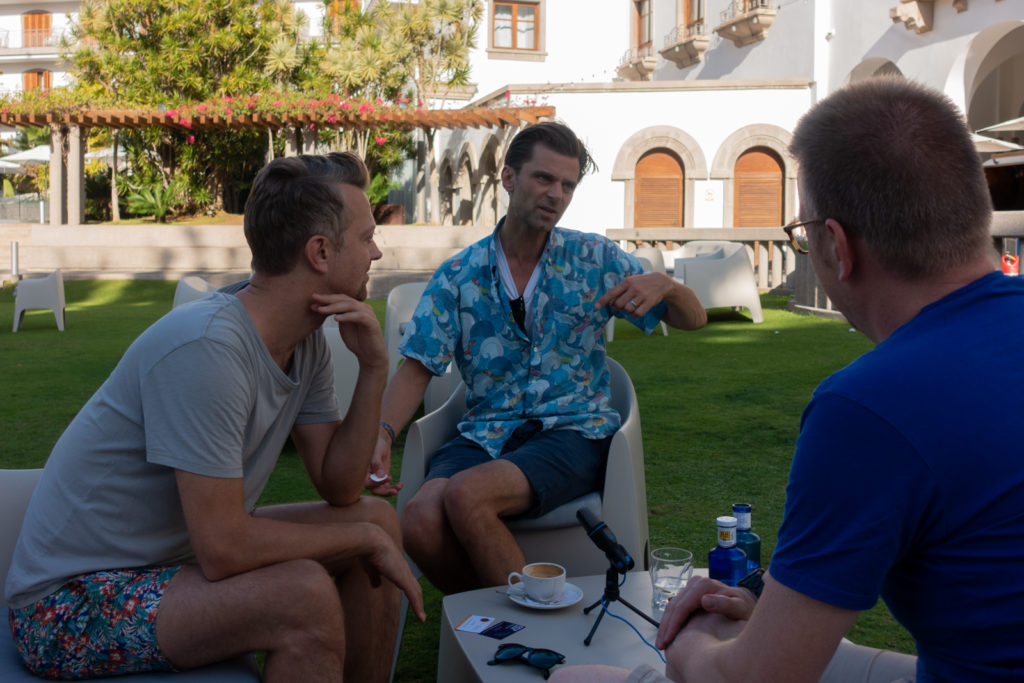
Anton Smit: In my family I am one of three sons, and after all these years, me and my brothers ended up doing totally different things. So how come you both ended up in the same profession?
Ben Foster: There is only two of us! We are only about 20 months apart, we kind of shared the same enthusiasms growing up. Perhaps I got them a bit younger and Nick would be watching something I would watch it with him. We share enthusiasm for things like cult TV.
Nick Foster: It was TV. We have always loved music from the beginning, but we also loved television. We used to make spy films like The Avengers. We were sort of obsessed with those when we were like six or something.
Ben: And Doctor Who! At the age where it was appropriate we would be filming and then we would make some soundtrack music to go with it. We would go to our neighbor’s house, where she had an amazing one of those big early keyboards where you could put rhythms on and drums, sounds, different strings and such, and that was our first score we did together. So that would be when we were aged nine and eleven. It was early on when we started collaborating in that respect. My mum is a music teacher, so there was an encouragement, and my dad is very enthusiastic about music although it was not his profession. So it was always there.
Nick: There is a lot of music in the family that goes back with live musicians or teachers or vicars actually. So we planned for music.
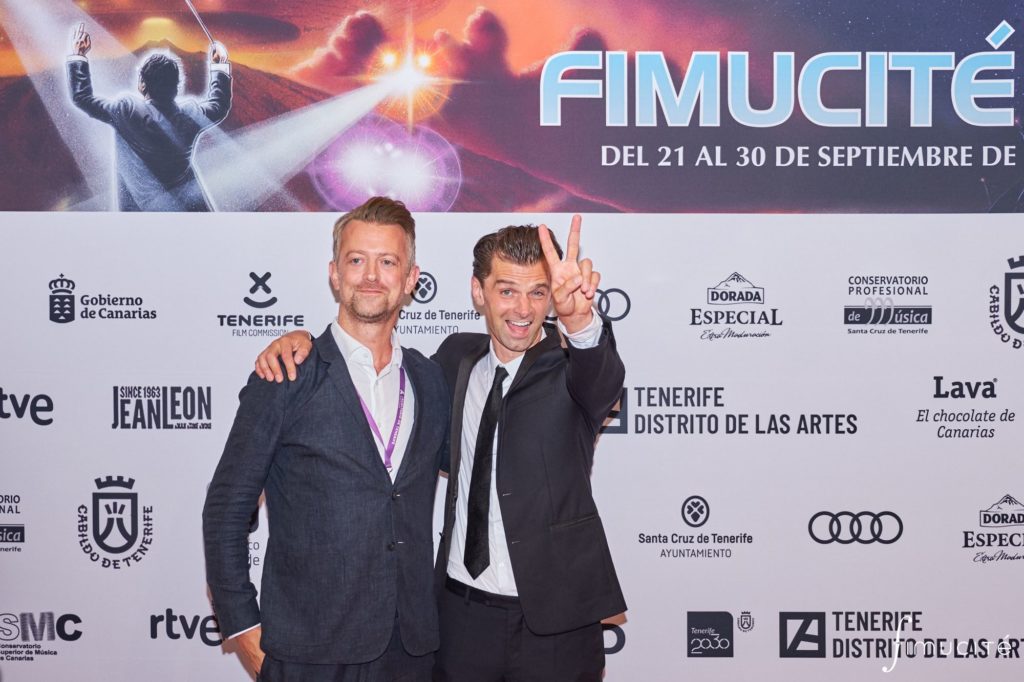
Anton: As you are collaborating, are you always on the same line or are there differences.
Nick: No…
Ben: I would love to say yes, but that would be boring. The truth is, we do argue; we fall out sometimes, but we share the same passion for the project, which at times we can differ. That is what makes it better, because we push it, it becomes something, and we are proud of Thunderbirds. To many people it is a show for five to eight-years-old right, but we know it is more than that, because it is a show for five to eight-years-old who will then become adults, and it is a point in their lives, where I think it is really important to give them something that is a good quality product.
When we were kids we grew up watching Doctor Who, serials or really great puppet shows on the television, and the quality was superb, it was first class, or like the Gerry Anderson shows, although he never wanted to use puppets in fact, he wanted to use live-action. He had to use puppets because of the budget. He did it so skillfully.
Nick: Yeah, he did not let the fact that he could not do a Bond movie stop him from giving it very best in what he was doing. It just reeks of the care that has got into it, proper professional people doing their best work on those shows.
Ben: As a result, it had such resonance with so many people, and it isn’t just about the stories, it is about the aesthetic of it that fans enjoy. Of course, Thunderbirds Are Go is of a different aesthetic, but it is in many ways a modern representation of the pioneering work in puppetry. This is pioneering use of CGI mixed with live-action effects and so forth.
Nick: The stuff they have done at Weta, which I think they perhaps can’t get enough credit for, is kind of ground-breaking. All those guys, if you go, as we have, to New Zealand, they have the original Gerry Anderson Puppets there. They are all making one-of models of Thunderbirds crafts. They love this stuff, they really love it. They build these amazing sets: a volcano here, a cable car over there and it is fantastic. It is not done with anything other than full love.
Ben: The original show is written simply to entertain children, and this show is also been made to entertain children. If you watch something at an early age, it stays with you for life. I still watch programs that I watched as a kid because there are so enjoyable and so comforting in a way. Maybe there is something about the old Thunderbirds. People in their fifties, sixties, forties, thirties, whatever, they gravitate back to it, and they care so much about it, because it represents an era of their lives when they were very happy as a result of this wonderful show that showed them an idea of the world where they could go, what they can do, how brave they could be, how wonderful life could be. I think that is still with this new version of the show.
Nick: I think so, time will tell. I certainly feel it could not have been made with more love, care or enthusiasm, and that I hope comes through and that is also how we felt about it.
Anton: Is it possible for you both to describe each others best skill?
Nick: Ben’s writing got the means to get into the heart of something, which is really specialized, I think. Sometimes we see a scene, and he just gets what it is all about. A melody or a move or something that just really gets you, and somehow sums the whole thing up. That is the first thing I would say.
Ben: It is funny to think about the differences, because we do not often think about that. I mean you can probably tell the way I am sitting and the way Nick is sitting: I am kind of fiddling. I am probably more, kind of, instinctive, but that does not make my instinctive composition any better. My point is, I am more. . . maybe instinctive is not the right word. . . maybe overzealous. Nick is more considered and mannered. His mannered approach can often get things to improve dramatically. I light the fire and Nick looks after the fire sometimes. Nick is thoughtful, kind and much more mannered I think. Whereas suppose, because I am a conductor as well, my energies are pretty fractious, and that comes through in composition I suppose. It is the kind of physicality, I can’t sit still sometimes in the studio.
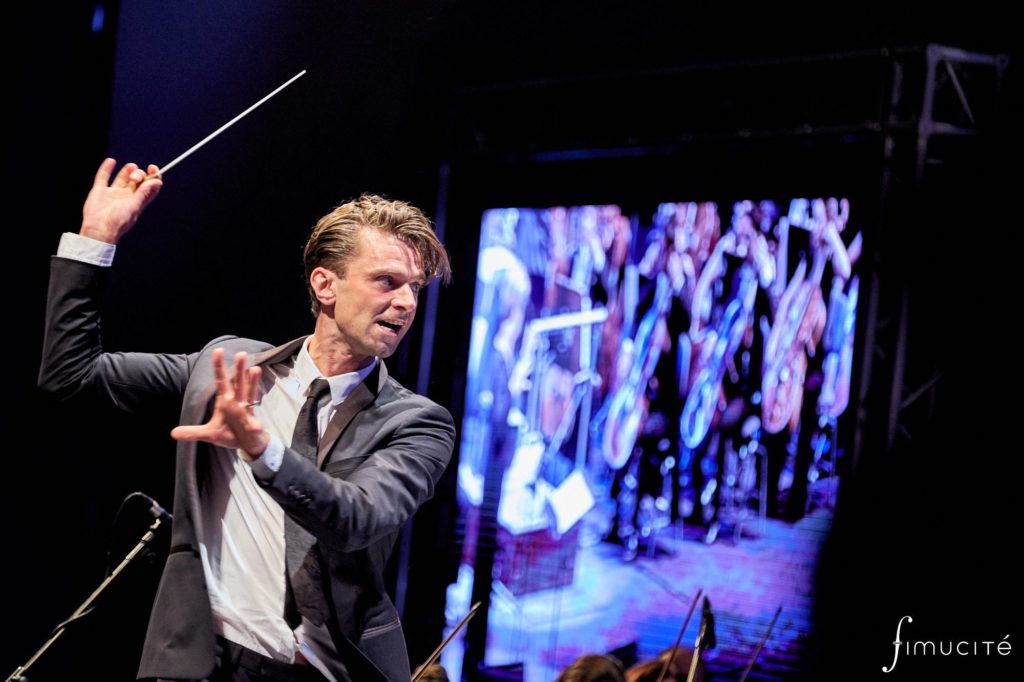
Nick: That is true. I think one of the great things about together that it is quite blurred, because after 78 episodes we have got themes that each one of us has written. Usually, one of us has always had a hand at some point or has taken it and reused it forty episodes on and developed it. We have a thing that we don’t really like to take a cue and just stick it in again. We like to take a cue and re-remember it, and play it again and developing on it a bit.
Ben: Only through that, it can really develop, and that is the episodic thing. It is like the wonderful thing with John Williams’s legacy: If John Williams got a theme for Darth Vader and has taken it and put it in the other film exactly, it would have been very disappointing, but he takes the theme and re-remembers it: maybe in a different key, maybe at a different speed, maybe it’s got an extra bit or it is slower, or maybe he just uses a fragment of it, which is a technique we come to know later on in the world of that music. We do the same things with our themes for Thunderbirds. We have a theme for Jeff Tracy, the father who is missing, throughout the whole series, but we have been using it all the way through it, since episode one, because he is at the top, he is the father-figure. Without him, literally, there will be no family, but also without his influence and his guidance. He has never really been absent.
Nick: It is strange. He is not there physically, but he is there all over the whole thing.
Ben: And that is why musically we have chosen to keep that always in, not knowing what would happen to him, if anything does happen to him, but we always had him in mind.
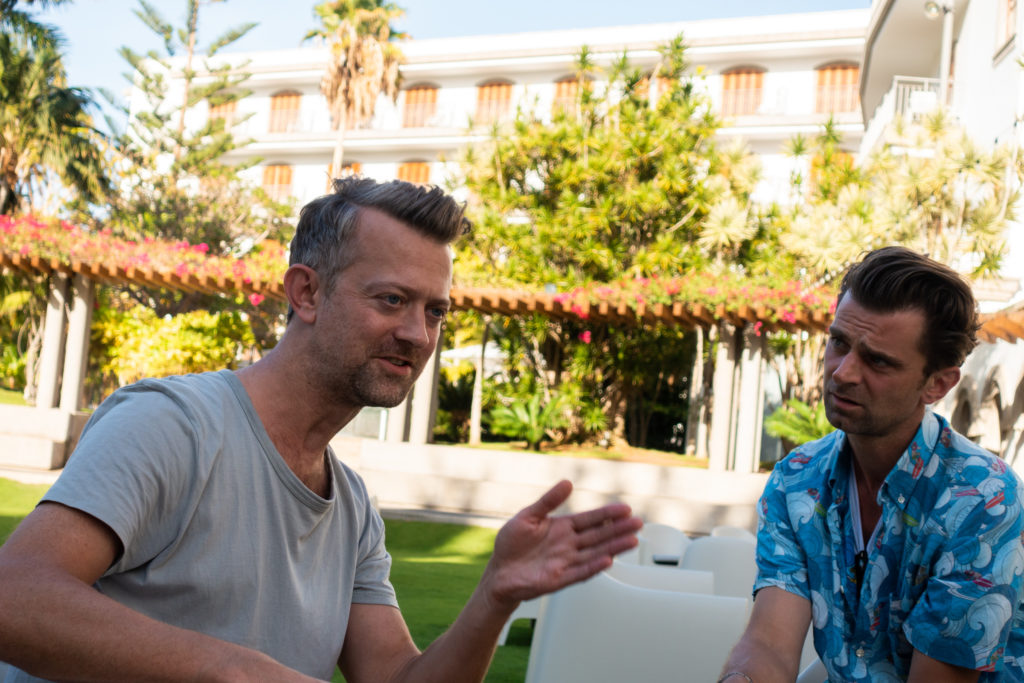
Anton: Since Thunderbirds is an animation, do you get the scenes when they are done, or do you get to see something unfinished?
Nick: It is locked. In other words: Except for extreme circumstances, the order of the shots isn’t going to change, the dialog isn’t going to change.
Ben: The duration of each episode isn’t going to change. The scenes are locked. Sometimes we see great craft and the next scene it’s literally someone like this going [Ben moving his arms in a weird manner], because they have not animated it. Sometimes they reuse shots, so if ‘Thunderbird 1’ flies across, it looks amazing, but that is because they reused the shot from another episode, like they used to do in the original show. Then you get a shot of Parker making a cup of tea and they never had that before.
Nick: It comes later. We get them at various stages, but they are ready for us to write to.
Ben: That is because the dialogue is recorded first. Like radio plays, in the way they rerecorded and then reshot those Thunderbirds episodes very recently, they used the soundtrack, the dialogue and the music. The dialogue is locked and it won’t change, so that is what we listen to even if the shots are a little bit hazy and not quite colored in.
Anton: So the music of each episode is written by both of you?
Ben: We often take responsibility for an episode, but neither of us will abandon it.
Nick: It is so interwoven now, we do sort of have trouble sometimes remembering. We sort of look back on something from 24 episodes ago. You can’t really remember, but partly because the themes are so intertwined, we both sort of have access to this library of the brain.
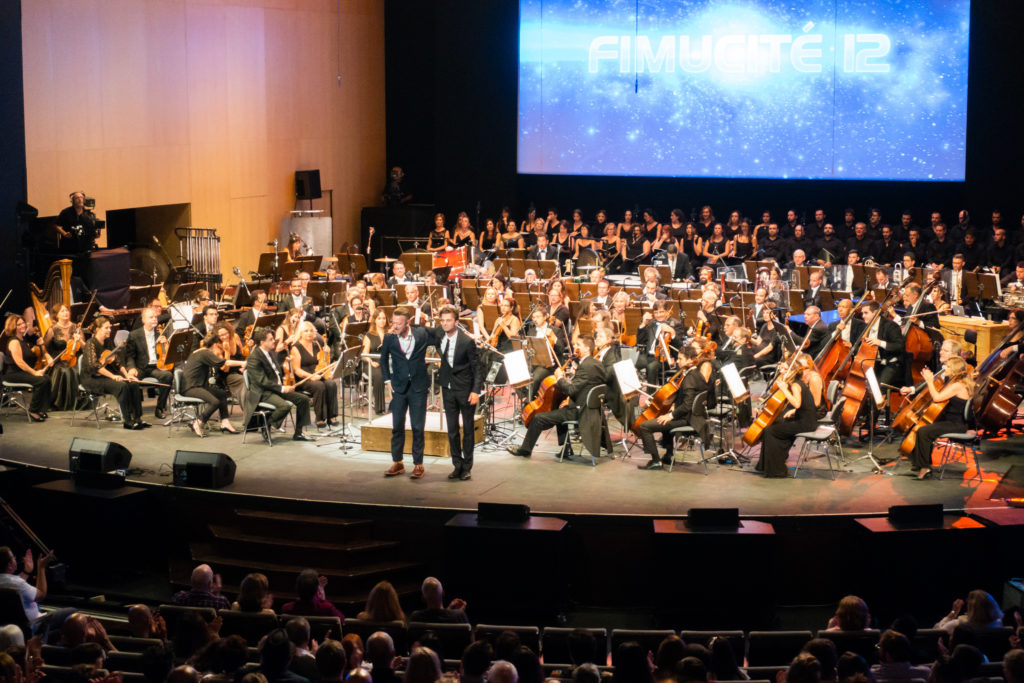
Ben: We have recorded with an orchestra 29 hours of music and that is in a three and a half to a four year period. We have also done, between us, about 130 hours of television in the last two years, maybe. So it is a lot. Sometimes you work on it very intensively, but if you come back to it eight months later, you probably have forgotten something in a way. Because we both have the ownership of it, both mentally and literally. We can both sit down and finish each other’s sentences musically for sure.
And sometimes, there will be a scene at the beginning of episode 313 where Nick will start and get a minute in and I will come back from getting a coffee and I will take the next minute, or he will close it down and I will open it up in my studio.
Nick: A lot of our best themes are being like that, where one of us has brought an idea in, but it is not quite done, and the other one plays with that and it develops. That is the way a collaboration, I think, really does work.
Ben: It should be seamless, and it is seamless. In this responsibility and relationship, neither one of us can say that I do the action music and Nick does the love themes. It is not like that. You would be surprised, some pieces that I think, maybe Nick might be known for from his other work and some stuff I might be known for from my other work.
Nick: That is what is really nice, any composer you meet in the day, they just don’t want to do what they have done before, they want to do something else. What is great is not to do the stuff within your own barriers, your own parameters. You don’t necessarily want to do just what you are known for. You get the chance to do different things within the collaboration.
Anton: Since you have been working on Thunderbirds for so long, how do you prevent fatigue from setting in, and keep the music interesting?
Ben: By doing other work, by doing lots of other shows. Since we have started I have done a show called Happy Valley, which is a big Netflix show. The darkest thing you can image: murder and rape and everything. I have done work on lots of other films for other composers: arranging and orchestrating. I have done lots of other TV shows as well.
Nick: I am just coming back to Thunderbirds now for the next four episodes, which we are on at the moment. I just come off doing a supernatural drama, 13 episodes of that, and then a comedy set in the jazz age. Then to come back to this, you have been somewhere else, you are just not doing the same thing. You are in other worlds, you are telling different stories. So that is how fatigue does not set in.
Ben: If we did it back to back for 78 episodes without a break, we would hate it. We don’t, we love it, because of the nature of the way we can work with producers and we are very lucky in the UK where the producers are very realistic and very generous. They trust you and that is the best thing. On Thunderbirds we spend money on the orchestra. We record the orchestra before they have heard it. It is very similar to what happened on Doctor Who, which is the scale of the production, and the scale of the amount that needs to be recorded is so that if there were too much toing and froing, backwards and forwards on cues here and there, it wouldn’t be possible. You can only do that if you have producers that trust you, and thankfully we have producers on Thunderbirds, the same producers all the way, like Giles Ridge who gave us the opportunity. It wasn’t in his budget, but we told him that we really wanted to try recording this with an orchestra. He knew of my work on Doctor Who and Nick’s work in other productions. He knew that we could deliver something that I hope felt like it stood up to the scale, the sound of a film soundtrack, the sound of the best of television soundtracks. That was his trust in us.
Nick: They have big departments. The show is made in New Zealand, in China, in London, in Prague. It is huge, and it is all happening in different time zones, simultaneously. To a certain extent they can’t be all over everything, they have to trust that department is doing its best, and we are the music department. We are in charge of that bit. Having that responsibility, as Ben says, I think pushes us, but it is also necessary.
Anton: Since Thunderbirds Are Go is concluding, what can we expect from you in the future?
Ben: As much as possible. It is sad to come to the end of something we have really enjoyed. We don’t have an exact replacement for it. We do have certain things that we hope would come off which are of the same vein, style, sound, which we can continue. We feel like we have got a sound with the show. It is specific to the show as much as it is specific to us. In the way that other composers leave certain jobs. John Williams is known for his sound. You would say that is John Williams, you wouldn’t say that sounds like Star Wars. We hope to find more and more productions. We do love Sci-Fi, we are not working in anything particularly Sci-Fi next. We would love to continue. The idea of a remake is not something that terrifies us at all, having worked on Doctor Who, being part of Murray Gold’s team on that show for 110 or 120 episodes. It is possible to take something that is beloved and not ruining it. To a certain extent, you have to leave your fandom and the pressure of it at the door. The pressure of what people expect it to be. That is something to really remember is that you make a show for a modern audience.
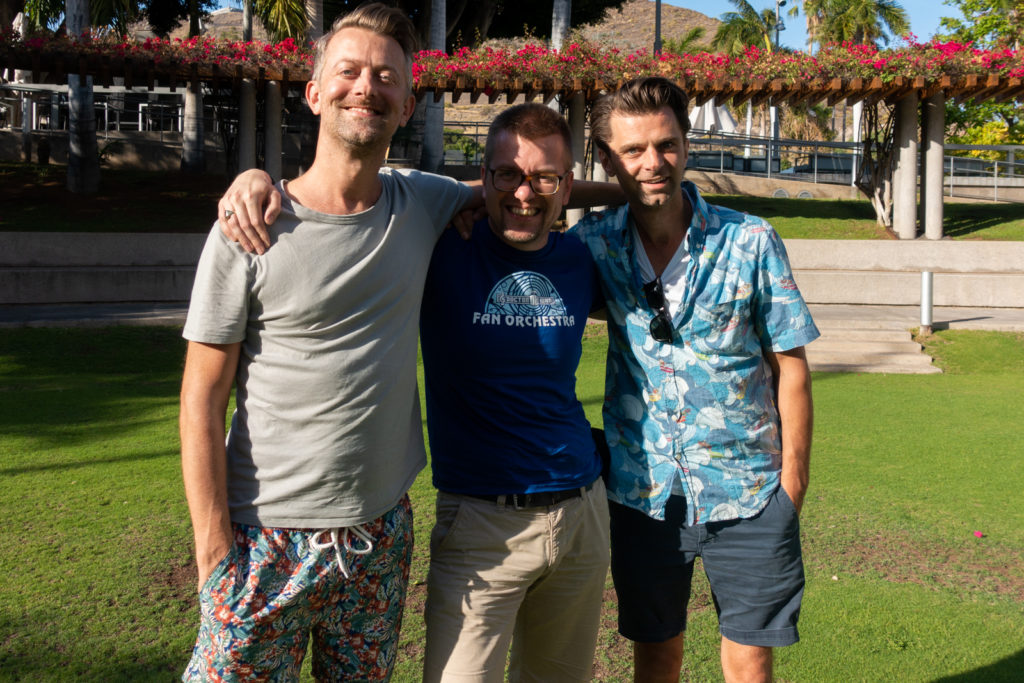
Nick: And any great show that has got on for years, imagine Doctor Who, is at its best when it is not being strangled by the weight of its mythology so much, and that stuff, I think, can be wonderful but can also hold you back and it can also limit.
Ben: There are times to play tribute. Occasionally, we reused some of the original music, little snippets, like when Silvia Anderson played a character we used a theme to represent her that was original from Barry Gray. Just to kind of show that we care as much about the original as we care about our new version.
Nick: Just a tip of the hat isn’t it?
Anton: Well thank you for this conversation.
Ben: Great Anton, thanks!
Nick: Thanks very much.

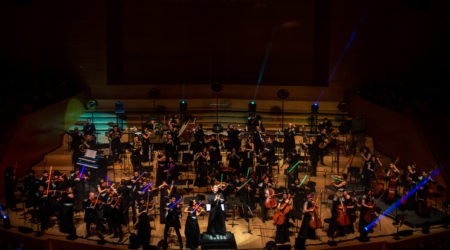
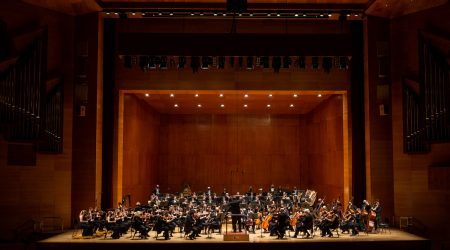
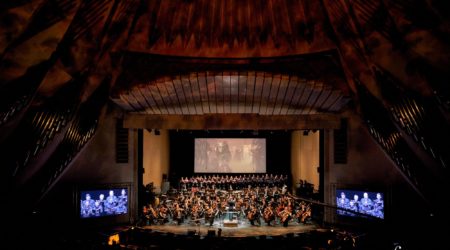

You guys should do the next Bond movie!
Much as I like your work I think its a pity you guys ended up with a weaker outro than the original series. The horn and drum crescendo at the end of the 1960s show with the rolls royce grille was such a rousing powerful heroic work of genius it still brings goosebumps to many lovers of the show. It was a perfect way to sign off each week.